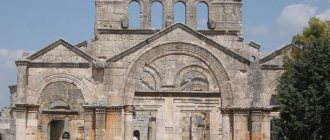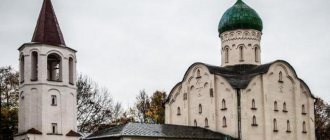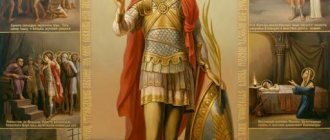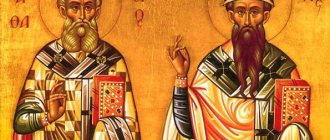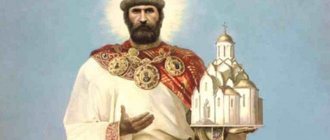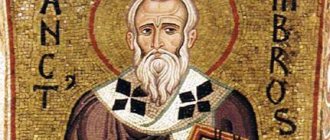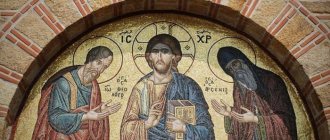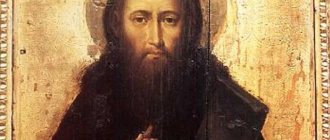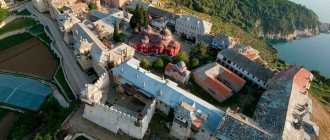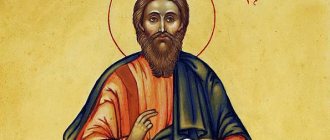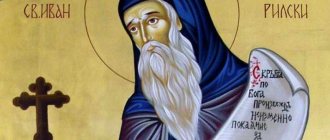Maria Mironenko, “Holy Righteous Alexy Mechev” (2012), portrait from photograph. Image from the site mariya-myronenko.com City Elder - this is what the contemporaries called Father Alexy Mechev, rector of the Church of St. Nicholas in Klenniki. At a time when faith weakened, persecution began and churches were emptying, a parish community similar to those of the Chief Apostles was born in Moscow.
From all over, on foot through Moscow, which was in a revolutionary transport collapse, parishioners hurried to the church before and after work: for services, for confession, for advice, for courses, for lectures, for obediences.
Whether it was a revolution, war, persecution or other cataclysms, Father Alexy’s behest was one: to do his job, fulfilling the commandments of love for God and neighbor. And God Himself will deal with cataclysms.
Meeting with Fr. John of Kronstadt
Father John of Kronstadt.
Photo from the site k-istine.ru After the appointment of the young priest Alexy Mechev on March 19, 1893 to the parish of St. Nicholas in Klenniki, he served daily for eight years in an empty church. This caused bewilderment and ridicule, but Father Alexy continued to pray. And people went to the temple.
By the time of his appointment to Klenniki, Father Alexy had four children. His marriage was happy, and the death of Mother Anna in 1902 became a grief for him.
“The whole world has gone dark for me. I locked myself in my room, didn’t want to go out to people, poured out my grief before the Lord,” recalled Fr. Alexy.
The parishioners of the Maroseya temple, the Belov merchant family, arranged a meeting of the holy righteous John of Kronstadt with the widowed father Alexy.
“Have you come to share my grief with me?” - Father Alexy asked the great shepherd. “I did not come to share grief, but joy; The Lord visits you! Leave your grief and go out to the people... - answered Father John... - Be with the people, enter into their grief, take it upon yourself, and then you will see that your misfortune is small, and it will become easier for you.”
“I listened to the words of Father John,” said the priest, and from then on, consoling a person, sharing his pain becomes the first pastoral concern and the testament of Father Alexy to his spiritual children-priests: “A shepherd must unload the pain and grief of others.”
Father Alexy did not start with the rules, conditions and requirements for a person who had just come to the temple. The first thing he did was listen and be compassionate.
He was distinguished by amazing humility before God's providence for every person: he tried to see what God planned for a person, what does God want from this person? For the priest, as for the Savior Himself, there were no rejected people. Everyone was valuable and dear to him. That’s why people came and his parish grew, at a time when many churches were emptying.
The memoirs about the artist Robert Falk tell how he, unbaptized, in severe depression, came to Father Alexy - one of his friends said: go see the priest, he is good, he serves not far from you. Falk came, and Father Alexy didn’t tell him anything about Christ, he just drank tea with him and asked: how are you doing, etc. And Falk then asked: can I come to you again? Because he felt that he simply felt good as a human being.
After all, what is a holy man to people? The one who is closer to God, whom God hears.
An amazing birth story and childhood
In the spring of 1859, the Chudovsky choir of a small Moscow church was headed by regent Alexei Ivanovich Mechev, who in his own way had a unique biography.
In his early childhood, at the invitation of Metropolitan Philaret, boys gifted with musical talent came to the saint’s courtyard, little Alyosha fell asleep in the hallway, and he was left on the street on a frosty night without noticing his disappearance. During the meal, the Metropolitan suddenly rose from the table and went out into the street, carefully examining the convoy, and noticed a freezing boy. Saint Philaret saw in this a manifestation of God’s will and until the end of his life he showed concern for both the boy, Alyosha Mechev, and his future family.
Priest Alexy Mechev
The matured Alexey married Alexandra Dmitrievna. They were soon overjoyed by the news of the birth of a child, but when the time of birth arrived, it became clear that death was threatening to take mother and child.
It was on the feast of St. Alexis. The saddened regent went to pray to the saint at the Alekseevsky Monastery, where Metropolitan Philaret served at that time. The Bishop immediately saw the grief on the face of his ward, they prayed together, the saint blessed the future father with a prosphora and ordered him to name the newborn boy in honor of Saint Alexy.
During the Divine Liturgy, there was the unceasing prayer of Metropolitan Philaret, which became a blessing at the birth on March 17, 1859 of a male child, the future prayer book of Russia, Alexy.
Their house had only 2 rooms, they were constantly filled with people. Anyone who needed shelter and consolation could spend the night here. From his compassionate mother, who could not leave her three children and sister, who was widowed early, on the street, Alyosha learned:
- love for people;
- kindness;
- quiet peaceful character.
The boy never got into arguments, stopped a quarrel, was constantly in a cheerful mood, ready to console at any moment. However, he had one peculiarity: while having fun, the boy suddenly froze, became serious and left, for which he was nicknamed blessed Alyoshenka.
Real
St. Nicholas Church on Maroseyka.
Photo from the site gavriil.info People felt that Father Alexy was close to God. And Falk felt that, as after visiting a good doctor, he felt better. And then he was baptized with the name Roman. The artist Mikhail Nesterov, coming to the service at the church on Maroseyka, said about Father Alexy: “He is real, genuine...” That’s what touched people - sincerity, that’s what people were looking for - a real priest, a real one.
One atheist teacher from the Winkler Gymnasium, where Fr. Alexy taught the Law of God, said that he knew only one true Christian - Fr. Alexia.
Of course, Father Alexy had exceptional spiritual gifts, which he constantly increased. He said about himself: “The Lord gave me a child’s faith.” Great faith and a loving heart.
The first thing Fr. Alexy, when a person came to him, began to pray with him, and often prayed with tears.
And this love, faith, trust in God was transmitted through him to others.
In the presence of Fr. Alexy, feeling his love, the person believed in the love of God - merciful, compassionate.
And during the liturgy, Fr. Alexy often cried while praying. Psalmist of the Church of St. Elijah the Prophet in the city of Vereya, where Fr. Alexy was leaving for the summer and told him:
“Father Alexy, it’s impossible to conduct the service with you..., even though I’m strong, I’m choking on tears. Is it possible to drive people this far? ... Don't be so upset... That's about it. Peter, you can’t knock a tear out of him even with a stake: hurry up, quickly... And you’ve been serving for such a long time; and I wanted to eat, and my heart began to ache from tears; God have mercy, you’ll still die!”
And o. Alexey will only say to him: “How can I not cry, Ilyusha, because I’m such a sinner!”
“Father, Ilya is stupid or something,” she asked Fr. about the psalm-reader. Alexia is the regent of the Temple of Maria. - Yes, a little, but he’s good, just incomprehensible. But God also needs such people,” answered Fr. Alexy.
The meaning of the priest’s pastoral service was to bring people closer to God, their spiritual growth. A person comforted and warmed by love more easily perceives instruction and guidance. Having himself been taught by Father John of Kronstadt to go to people, Father Alexy called on his spiritual children to learn to share the suffering and joy of others.
Orthodox texts in Russian
You can ask Father Alexei for help in your own words. A prayerful appeal to the saint will strengthen the request and allow the one praying to be heard more quickly in the Kingdom of Heaven.
Troparion
To the Shepherd of Christ, Father Alexis, / you fought a good fight, / you confessed the Orthodox faith in the darkness of lawlessness, / and, as a comforter and a spiritual doctor, / you healed all who came to you ́./ Help us, who honor you by faith, // in love for one's neighbor will be established.
Troparion
Like a miracle of God, you appeared,/ in the city of Moscow, Father Alexis,/ not in the desert, but in the midst of rumors, you flourished,/ in the time of fierce apostasy,/ you became like the ancients Thou art a seer, a man of prayer and an elder, and a comforter to the afflicted and the doctor,/ for this sake for the Russian flock,/ be an immutable intercessor now, // a prayer book for our souls.
Troparion for the transfer of relics
The day of a new celebration has come, / the city of Moscow rejoices, / and the entire Russian country rejoices / with new spiritual stumps, / today is a sacred celebration / in the presentation of the honest and multi-healing relics / of the righteous and wonderworker Alexy, / as if a most bright light has shone upon us with blessed rays , / consuming the darkness of illness and passions / from those who sing diligently, / save us with your prayers // Righteous Alexis, our father.
Kontakion
You have undertaken great labors of love and mercy,/ righteous Father Alexis,/ and, from the holy shepherd of Kronstadt, a blessing to help the suffering,/ the troubles and sorrows of people, I to the chains you have placed on your frame./ But we, who lead you boldly in prayer Lord, / with tenderness we call upon you // pray to Christ God for the salvation of our souls.
In kontakion
Through the simplicity of faith you have reached the heights of humility,/ while striving in prayer and good deeds,/ you have been enriched with spiritual gifts/ and you have been enlightened by the light of Christ,/ helper and comforter Father Alexi That is./ Moreover, strengthen our faith,/ teach us love for the Lord and our neighbors// and Bring us to salvation through your prayers.
Prayer
Oh, our all-honorable and blessed Father Alexis, the wondrous Elder of Moscow and praise and joy to the whole Russian Church! Having great love for the Lord, unfailingly fulfilling the covenants of the Gospel, you laid down your soul for your flock, grieving with a merciful heart for everyone who asked for your help. Accept this little prayer of ours, and as in your earthly life you wiped away every tear, eased every sorrow, so now, merciful prayer book and our intercessor, take away the burdens , our illnesses and sorrows, fill our suffering hearts with joy, beg God, the Lover of mankind, for forgiveness our countless sins, so that having cleansed our souls with repentance, let us begin to do good. To her, good elder, be a good shepherd for us too, guiding us on the path of salvation, so that through your prayers we will immaculately pass the path of our life and find the Heavenly Fatherland, where you are with the angels and holy to all Before us stand the Throne of the Holy Trinity, glorifying the Beginning Father with His Only Begotten Son and the Most Holy One , and the Good, and His Life-giving Spirit forever and ever. Amen.
Without fence
Father Alexy Mechev performs a prayer service.
Photo from the site journalpp.ru The ability to live, serve and pray as if outside of urban conditions, bustle and noise amazed many. In the busiest place there is a temple. There is not even a fence between the church and the street. In the world of Jurassic, with active parish activity, crowds, in the Church of St. St. Nicholas in Klenniki preserved an exclusively prayerful, almost skete-like atmosphere,” wrote one of the priests who served him, Father Sergius Durylin, in his memoirs about Father Alexy.
And the world around is becoming more and more hostile. 1905 Demonstrations. Slogans outside the temple window: down, down, down...
A group of students comes in to beat the priest. Father Alexy greets them with a smile and the words: “It’s so good that young people came to church. Have you come to remember your parents? The students muttered dumbfoundedly: “Yes-ah,” smiling guiltily.
Optina Elder Anatoly always sent Muscovites to Father Alexy, and also Optina Father. Nektary once said to someone: “Why do you come to us, you have your own elder, Fr. Alexy is there.”
The rector of the Optina monastery was Abbot Theodosius, who loved Fr. Alexia, on one of his visits to Moscow, came to the Church of St. Nicholas in Klenniki. Having seen how the service was going, how many confessors and communicants there were, he then said to Fr. Alexia:
“For all this work that you are doing alone, we would need several people in Optina. This is beyond the strength of one person. The Lord is helping you."
However, Fr. Alexia and ill-wishers. Once on the tram Fr. Alexy witnessed a conversation between two priests who criticized famous Moscow clergy. Arriving at the Church of St. Nikola in Klenniki, and remembering Fr. Alexia, and they “walked through it”:
Here, too, he acts like a fool, portrays an old man... the people accept him..., he gives advice and rakes in a lot of money... You know, he has an income of ten thousand!
Fr. Alexy, getting off at the stop he needed, paused near those who were talking and remarked in a friendly manner: “Everything you say about Fr. Alexia is true. You were only mistaken about one thing: his income is not ten, but fifteen thousand,” and got off the tram.
The next day, one of the priests came to the priest and asked for forgiveness with deep repentance.
The Life of the Righteous Archpriest Alexei Mechev
The holy righteous Alexy Mechev was born on March 17, 1859 into the pious family of the regent of the Chudovsky Cathedral Choir. His father, Alexey Ivanovich Mechev, the son of the archpriest of the Kolomna district, as a child was saved from death in the cold on a cold winter night by St. Philaret, Metropolitan of Moscow and Kolomna. Among the boys from the families of the clergy of the Moscow diocese, selected according to the criterion of sufficient musicality, he was brought late in the evening to Trinity Lane at the metropolitan courtyard. When the children were having dinner, Vladyka Metropolitan suddenly became alarmed, quickly got dressed and went out to inspect the arriving convoy. In one sleigh he found a sleeping boy, left there due to an oversight. Seeing the Providence of God in this, Metropolitan Philaret paid special attention and care to the child he saved, constantly caring for him, and subsequently for his family.
The birth of Father Alexy occurred under significant circumstances. His mother, Alexandra Dmitrievna, felt unwell at the onset of childbirth. The birth was difficult, very long, and the lives of mother and child were in danger.
In great grief, Alexey Ivanovich went to pray at the Alekseevsky Monastery, where Metropolitan Philaret served on the occasion of the patronal feast day. Walking into the altar, he quietly stood aside, but the grief of his beloved regent did not hide from the bishop’s gaze. “You’re so sad today, what’s wrong with you?” he asked. - “Your Eminence, my wife dies in childbirth.” The saint prayerfully made the sign of the cross. “Let’s pray together... God is merciful, everything will be fine,” he said; then he handed him a prosphora with the words: “A boy will be born, name him Alexei, in honor of Saint Alexis, the man of God, whom we celebrate today.” Alexey Ivanovich was encouraged, defended the liturgy and, inspired by hope, went home. At the door he was greeted with joy: a boy was born.
In a two-room apartment on Troitsky Lane, in the family of the regent of the Chudovsky choir, a living faith in God reigned, warm hospitality and hospitality were shown; here they lived the joys and sorrows of everyone whom God brought to be in their home. It was always crowded, relatives and friends constantly stopped by, who knew that they would be helped and consoled. All his life, Father Alexy recalled with reverence the selfless act of his mother, who took in her sister and three children after the death of her husband, despite the fact that he himself was close to his three children - sons Alexei and Tikhon and daughter Varvara. We had to build a bed for the children. Among his siblings and siblings, Lenya, as Alexei was called in the family, stood out for his kind-heartedness and quiet, peace-loving character. He did not like quarrels, he wanted everyone to feel good; loved to cheer, console, joke. All this came out to him in a pious manner. When visiting, in the midst of games in the children's rooms, Lenya suddenly became serious, quickly walked away and hid, withdrawing into himself from the noisy fun. Those around him nicknamed him “blessed Alyoshenka” for this. Alexey Mechev studied at the Zaikonospassky School, then at the Moscow Theological Seminary. He was diligent, efficient, ready for any service. When I graduated from the seminary, I still didn’t have my own corner, which was so necessary for studying. To prepare homework, I often had to get up at night. Together with many of his classmates, Alexey Mechev had the desire to go to university and become a doctor. But his mother resolutely opposed this, wanting to have him as a prayer book. “You’re so small, why should you be a doctor? You’d better be a priest,” she said firmly. It was hard for Alexey to give up his dream: the activity of a doctor seemed to him the most fruitful in serving people. He said goodbye to his friends with tears, but he could not go against the will of his mother, whom he respected and loved so much. Subsequently, the priest realized that he had found his true calling, and was very grateful to his mother. After graduating from the seminary, Alexey Mechev was appointed on October 14, 1880 as a psalm-reader at the Znamenskaya Church of the Prechistensky Forty on Znamenka. Here he was destined to undergo a difficult test. The rector of the temple was a man of tough character, unreasonably picky. He demanded that the psalm-reader perform duties that lay on the watch, treated him rudely, even beat him, and sometimes waved him with a poker. The younger brother Tikhon, visiting Alexei, often found him in tears. Sometimes the deacon stood up for the defenseless psalm-reader, and he endured everything resignedly, without expressing complaints, without asking to be transferred to another church. And subsequently he thanked the Lord for allowing him to go through such a school, and remembered the abbot, Father George, as his teacher. Already a priest, Father Alexy, having heard about the death of Father George, came to the funeral service, accompanied him to the grave with tears of gratitude and love, to the surprise of those who knew the attitude of the deceased towards him. Then Father Alexy said: when people point out shortcomings that we ourselves do not notice, they help us fight our “yashka”. We have two enemies: “okayashka” and “yashka” - this is what the priest called pride, the human “I”, which immediately declares its rights when someone, willy-nilly or not, hurts and infringes on it. “Such people must be loved as benefactors,” he later taught his spiritual children. In 1884, Alexy Mechev married the daughter of a psalm-reader, eighteen-year-old Anna Petrovna Molchanova. That same year, on November 18, he was ordained as a deacon by Bishop Misail of Mozhaisk. Having become a servant of the altar, Deacon Alexy experienced a fiery zeal for the Lord, and outwardly showed the greatest simplicity, humility and meekness. His marriage was happy. Anna loved her husband and sympathized with him in everything. But she suffered from a serious heart disease, and her health became the subject of his constant concern. In his wife, Father Alexy saw a friend and first assistant on his path to Christ; he valued his wife’s friendly remarks and listened to them the way another listens to his elder; immediately sought to correct the shortcomings she noticed. Children were born into the family: Alexandra (1888), Anna (1890), Alexey (1891), who died in the first year of his life, Sergei (1892) and Olga (1896). On March 19, 1893, Deacon Alexy Mechev was ordained by Bishop Nestor, head of the Moscow Novospassky Monastery, as a priest to the Church of St. Nicholas the Wonderworker in Klenniki Sretensky Forty. The consecration took place at the Zaikonospassky Monastery. The Church of St. Nicholas the Wonderworker in Klenniki on Maroseyka was small, and its parish was very small. In the immediate vicinity there were large, well-attended temples. Having become the rector of the single-staff Church of St. Nicholas, Father Alexy introduced daily services in his church, while usually in small Moscow churches they were performed only two or three times a week. The priest came to the temple almost at five o’clock in the morning and unlocked it himself. Reverently venerating the miraculous Theodore Icon of the Mother of God and other images, he, without waiting for anyone from the clergy, prepared everything necessary for the Eucharist and performed proskomedia. When the appointed hour approached, he began Matins, which he himself often read and sang; then followed the liturgy. “For eight years I served the liturgy every day in an empty church,” the priest later said. “One archpriest told me: “No matter how much I pass by your church, everyone calls you. I went into the church - it was empty... Nothing will come of it, you’re calling in vain.” But Father Alexy was not embarrassed by this and continued to serve. According to the then-current custom, Muscovites fasted once a year during Great Lent. In the St. Nicholas-Klenniki Church on Maroseyka Street one could confess and receive communion any day. Over time, this became known in Moscow. A case is described when a policeman standing at his post found the behavior of an unknown woman suspicious at a very early hour on the banks of the Moscow River. When he approached, he learned that the woman was in despair from the hardships of life and wanted to drown herself. He convinced her to abandon this intention and go to Maroseyka to Father Alexy. Grieving, burdened with the sorrows of life, dejected people flocked to this temple. From them a rumor spread about his good abbot. The life of the clergy of numerous small parishes of that time was financially difficult, and living conditions were often poor. The small wooden house in which Alexy’s father’s family lived was dilapidated, half-rotten; The neighboring two-story houses standing closely shaded the windows. In rainy times, streams, running down from Pokrovka and Maroseyka, flowed into the courtyard of the temple and into the basement of the house; the apartment was always damp. Mother Anna Petrovna was seriously ill. She developed cardiac dropsy with large edema and painful shortness of breath. Anna Petrovna died on August 29, 1902, on the day of the beheading of the head of the Forerunner and Baptist of the Lord John. At that time, a merchant family very close to Father Alexy (Alexey and Claudia Belov) invited the righteous Father John of Kronstadt, who had come to Moscow, to their home, with whom they were in contact on matters of charity. This was done so that Father Alexy could meet him. “Have you come to share my grief with me?” Father Alexy asked when Father John entered. “I didn’t come to share your grief, but your joy,” answered Father John. – The Lord visits you. Leave your cell and go out to people; only from now on will you begin to live. You rejoice at your sorrows and think: there is no greater grief in the world than yours... But you be with the people, enter into someone else’s grief, take it upon yourself, and then you will see that your misfortune is insignificant in comparison with the general grief, and it will become easier for you.” . The grace of God, abundantly resting on the Kronstadt shepherd, illuminated the life path of Father Alexy in a new way. He accepted what was indicated to him as obedience entrusted to him. He was undoubtedly prepared for the perception of the grace of old age by many years of truly ascetic life. Father Alexy met those who were looking for help in the Maroseya church, broken by difficult circumstances, mutual hostility, mired in sins, who had forgotten about God, with heartfelt friendliness, love and compassion. The joy and peace of Christ were infused into their souls, hope was manifested in the mercy of God, in the possibility of soul renewal, the love shown towards them gave everyone the feeling that they were loved, pitied, and consoled more than anyone else. Father Alexy received from God the gracious gift of clairvoyance. Those who came to him could see that he knew their whole life, both its external events and their spiritual aspirations and thoughts. He revealed himself to people to varying degrees. Out of deep humility, I always tried not to show the fullness of this gift. He usually spoke about any details, details of a situation still unknown to the interlocutor, not directly, but allegedly talking about a similar case that had recently taken place. The priest gave instructions on how to proceed in a specific matter only once. If the visitor objected, insisted on his own, then Father Alexy withdrew from further conversation, did not explain what the unreasonable desire would lead to, and did not even repeat what was originally said. He could sometimes give the blessing required from him. To those who came with a repentant feeling and full of trust, he provided prayerful assistance, interceding for them before the Lord for deliverance from difficulties and troubles. Father Alexy became known as a kind father, whom one should turn to in difficult moments for the family. It was not in his rules to read instructions, denounce, or analyze someone’s bad deeds. He knew how to talk about the moral aspects of family situations without affecting the painful pride of the parties to the conflict. And he was invited to services at critical moments. Coming to a family that was ready to fall apart, the priest brought into it peace, love and an all-forgiving understanding of everyone. He did not blame anyone, did not reproach, but tried, by citing vivid cases of mistakes and delusions, to bring those listening to the consciousness of his guilt, to evoke in them a feeling of repentance. This dissipated the clouds of anger, and the guilty began to feel wrong in their actions. Proper understanding often did not come immediately, but later, when a person, remembering the words of Father Alexy and looking deeper into his softened soul, could finally see that his stories were directly related to him, and understand what new path he was charting for him. In the lower residential floor of the temple, the priest opened an elementary parochial school, and also set up a shelter for orphans and children of poor parents. Children learned useful crafts there. For 13 years, Father Alexy taught children the Law of God at the private girls’ gymnasium E.V. Winkler. Having blessed his spiritual daughter Maria, who came to his church as a teenage girl shortly after her father’s death, to paint icons, the priest contributed to the further revival of ancient Russian icon painting, which had been in oblivion for several centuries, giving way to painting. At that time, Father Alexy began to perform divine services in the church not only in the morning, but also in the evening (vespers and matins). The priest's sermons were simple, sincere, they were not distinguished by eloquence. What he said touched the heart with the depth of faith, truthfulness, and understanding of life. He did not use oratorical techniques, focusing the attention of his listeners on gospel events and the lives of saints, while remaining completely in the shadows. Father Alexy's prayer never stopped. By his example, the priest showed that with the noise and bustle of life in the city, you can be far from everything earthly, have unceasing prayer, a pure heart, and stand before God while still here on earth. When asked how to improve the life of the parish, he answered: “Pray!” He called on his spiritual children to pray during the funeral services: “Once again you will come into contact with the departed... When you appear before God, they will all raise their hands for you, and you will be saved.” The number of worshipers in the temple increased. Especially after 1917, when those who left the Church, having experienced numerous troubles, rushed to churches in the hope of God’s help. After the closure of the Kremlin, part of the parishioners and singers of the Chudov Monastery moved, with the blessing of Bishop Arseny (Zhadanovsky), to the church of Father Alexy. Many young people appeared, students who saw that the revolution, instead of the promised benefits, brought new disasters, and now sought to comprehend the laws of spiritual life. During these years, zealous young priests and deacons who had received their education began to serve on Maroseyka, including the son of Father Alexy, Father Sergius Mechev, who was ordained a priest on Holy Thursday 1919. They also helped in conducting lectures, conversations, and organizing courses on the study of divine services. But the burden on Father Alexy was increasing. Too many wanted to receive his blessing on any matter, to listen to his advice. Previously, Father had to receive some of those who came in his apartment in the clergyman’s house, built before the First World War by the famous publisher I.D. Sytin. Now one could see endless queues at the doors of the house; in the summer, visitors stayed overnight in the temple courtyard. Great was the humility of Father Alexy. He was never offended by any rudeness towards himself. “What am I?.. I’m poor...” he used to say. Once, having forced his spiritual daughter to remember in confession that she spoke badly about her relative and did not attach any importance to it, he told her: “Remember, Lydia, that there is no one worse than you and me in the whole world.” The priest avoided showing signs of reverence and respect towards himself, avoided lavish services, and if he had to participate, he tried to stand behind everyone. He was burdened by awards, they burdened him, causing him deep, sincere embarrassment. Due to the efforts of the Chudov sisters, in 1920 His Holiness Patriarch Tikhon awarded the priest the right to wear a cross with decorations. Priests and parishioners gathered in the temple in the evening to congratulate him. Father Alexy, usually smiling and joyful, looked alarmed and upset. After a short prayer service, he turned to the people with contrition, speaking of his unworthiness, and, bursting into bitter tears, asked for forgiveness and bowed to the ground. Everyone saw that, accepting this award, he really felt unworthy of it. The true spiritual friends of Father Alexy were the contemporary Optina ascetics - the elder Hieroschemamonk Anatoly (Potapov) and the monastery leader Abbot Theodosius. Father Anatoly directed Muscovites who came to him to see Father Alexy. Elder Nektarios said to someone: “Why are you coming to us? You have Father Alexy.” Father Theodosius, having once arrived in Moscow, visited the Maroseya temple. I was at the service, I saw how the lines of confessors walked, how earnestly and long the service went on, the commemoration was performed in detail, how many people were waiting to be received. And he said to Father Alexy: “For all this work that you are doing alone, we would need several people in Optina. This is beyond the strength of one person. The Lord is helping you." His Holiness Patriarch Tikhon, who always took into account the recall of the priest in cases of consecration, invited him to take on the work of uniting the Moscow clergy. The meetings took place in the Cathedral of Christ the Savior, but due to the conditions of that time they were soon discontinued. The attitude of the clergy towards the priest was very different. Many recognized his authority, some of the shepherds were his spiritual children and followers, but there were also many who criticized him. In the last days of May according to the new style of 1923, Father Alexy went, as in previous years, to rest in Vereya, a remote town in the Moscow region, where he had a small house. Before leaving, he served his last liturgy in the Maroseya church, said goodbye to his spiritual children, and when he left, he said goodbye to the temple. Father Alexy died on Friday, June 9/22, 1923. The last evening he was joyful, affectionate with everyone, remembering those who were absent, especially his grandson Alyosha. Death occurred as soon as he lay down in bed, and was instantaneous. The coffin with the body of Father Alexy was delivered to the Church of St. Nicholas the Wonderworker in Klenniki on a horse on Wednesday, June 14/27 at nine o’clock in the morning. The church communities of Moscow, led by their pastors, came one after another to sing requiems and say goodbye to the deceased. This lasted until the very morning of the next day to give everyone who came the opportunity to pray. Two funeral vigils were served in the evening: one in the church and the other in the courtyard. The liturgy and funeral service were performed at the head of the host of clergy by Archbishop Theodore (Pozdeevsky), rector of the Danilov Monastery - Father Alexy requested this in his letter shortly before his death. Vladyka Theodore was then in prison, but on June 7/20 he was released and was able to fulfill the priest’s wish. Easter chants were sung all the way to the cemetery. The confessor of Christ, His Holiness Patriarch Tikhon, who had just been released from prison, arrived at the Lazarevskoye cemetery to see off Father Alexy on his final journey. He was enthusiastically received by crowds of people. The prophetic words of the priest came true: “When I die, there will be joy for everyone.” Lithium was served by Archimandrite Anempodistos. His Holiness blessed the coffin being lowered into the grave and was the first to throw a handful of earth on it. During his lifetime, Father Alexy told his spiritual children to come to his grave with all their difficulties, troubles, and needs. And many went to see him at the Lazarevskoye cemetery. Ten years later, due to the closure of the Lazarevskoye cemetery, the remains of Father Alexy and his wife were transferred on September 15/28, 1933 to the Vvedenskie Gory cemetery, popularly called German. The body of Father Alexy was incorrupt at that time. Only on one of the legs the ankle joint was broken and the foot was separated. All subsequent decades, the grave of Father Alexy was, according to the cemetery administration, the most visited. Thanks to stories about the help received, and later publications, many people learned about Father Alexy and, asking for his intercession in their troubles and difficult everyday circumstances, were consoled by the priest. We regularly had to add land to the grave mound, since those who resorted to the help of Father Alexy took it with them... On the first anniversary of the death of Father Alexy, the Maroseya community invited everyone who wished to write about their meetings with the priest, to which many responded. These memories were unequal; but in some of them cases of clairvoyance, examples of miracles, signs and prayerful help of the elder are attested. One woman from Tula lost her only son. There was no news from him for six months; the mother was in a difficult state. Someone advised her to contact Father Alexy. She came to Moscow, came straight to the Church of St. Nicholas the Wonderworker in Klenniki, and at the end of the liturgy, along with everyone else, went to venerate the cross. Several more worshipers separated her from the priest, whom she saw for the first time, when he handed her a cross over the heads of those walking in front of her and said impressively: “Pray as if you were alive.” Confused by surprise, she became embarrassed and was embarrassed to approach again. Not having the strength to calm down, she turned to the priest, who knew the priest well, and he brought her to his home. As soon as she entered the room and took the blessing, the priest, having not yet heard a single word from her, and she could not speak from excitement and the tears that were choking her, took her by the shoulder and, looking into her eyes with love and affection, said: “ Happy mother, happy mother! What are you crying about? I’m telling you: he’s alive!” Then, going up to the desk, he began to sort through the paper icons lying on it, saying: “The other day, too, my mother visited me: she’s always worried about her son, but he’s quietly serving in Sofia at a tobacco factory. Well, God bless,” and with these words he blessed her with an icon. It was during Bright Week. At the end of September, she received a letter from her son from Bulgaria, where he said that he was working in Sofia at a tobacco factory. Olga Serafimovna, a person from the upper strata of society, deeply religious and church-going, was the head of an orphanage, which was under the guardianship of Grand Duchess Elizabeth Feodorovna. She often visited the Church of St. Nicholas the Wonderworker in Klenniki with Father Alexy. And he visited the shelter at her invitation. One day, one of her subordinate employees, the caretaker of the orphanage, gathered with her for mass in this church. After the liturgy, approaching the cross, Olga Serafimovna thought: “What if the priest tells me something now that will lower my dignity and authority in the eyes of my subordinate?” Fearing this, she invited her colleague to go ahead of her, but she did not want to. Seeing Olga Serafimovna, the priest raised the cross high and, blessing her with a broad, firm gesture, loudly and abruptly said: “Olga! for others he said...” and, looking at her with the usual benign smile, continued to give the cross to those who approached. One day, a boy who had learned to steal was brought to his priest for a reception. Father, who opened the door himself and had not yet heard anything about him, said sternly to him: “Why are you stealing? It's not good to steal." One lady named Vera, who served in the church, received permission to see the priest during his illness. On the way to him she kept thinking: “Lord! What should I do, because I have two sisters, both disabled, I support them, what will happen to them when I die?..” As soon as she entered the priest’s room, he greeted her with the words: “Oh, Vera, without faith, and you also wear a headscarf, church sister. Why do you take everything upon yourself and don’t want to leave anything to God? No, this is what you say, leave all these doubts at the door and believe that God will protect your sisters better than you.” One woman came to ask the priest if she should get married. Her husband was captured by the Germans during the 1914 war. Almost 9 years have passed since then, and there is no news about him, but a very good man is wooing her. Instead of answering, the priest said: “Here, dear ones, are some cases: one woman came to me and said: “Father, bless me to get married, since my husband has been in captivity for many years and, apparently, he is no longer alive. And a very good man is wooing me.” I didn’t bless her, but she still got married. She just got married, and eight or nine days later her husband returns from captivity. And so two husbands, and with them a wife, came to resolve the question of whose wife she was now. These are the cases...” The questioner got scared and decided to wait, and a few days later her husband unexpectedly returned. One Friday, after the end of the liturgy, two girls dressed in black approached the priest with a request to bless them to enter the monastery. He blessed one of them willingly and gave a large prosphora, and the other said: “You go back home, you are needed there, and I will not bless you for going to the monastery.” The girl walked away embarrassed and disappointed. People around were curious about who she lived with and under what conditions. The girl replied that she lives with a sick old mother who doesn’t want to hear about her daughter leaving for a monastery, because then she will be left completely alone. After the prayer service on Wednesday, a woman approached the priest, fell at his feet and, sobbing, began shouting: “Father, help! Father, save me! I can’t live in the world anymore: my last son was killed in the war,” and she began to bang her head on the candlestick next to the icon of St. Nicholas. Approaching, the priest addressed her with the following words: “What are you doing, how can you despair so much? Here is our great intercessor and prayer book before the Lord.” And, helping her get to her feet, he immediately began a prayer service to St. Nicholas, and said to her: “Make three prostrations. You don’t have time to stand for prayer. I’ll pray for you alone, and you go home quickly, great joy awaits you there.” And the woman, encouraged by the priest, ran home. The next day, during the early liturgy, which was celebrated by Father Alexy, yesterday’s visitor noisily ran in. She wanted to see the priest as soon as possible, repeating in an excited voice: “Where is the priest?” She reported that when she came home yesterday, she found on the table a telegram from her son, which told her to immediately come to the station to meet him. “Yes, here he comes,” she pointed to the young man who was entering at that moment. The priest was called from the altar. With a sob, the woman fell to her knees in front of him and asked to serve a thanksgiving prayer service. During Great Lent, after a prayer service, a woman approaches Father Alexy: “Father, help, I’m completely tormented by grief. You won’t have time to see off five before you’ll meet nine.” Father, looking intently into her face, asked: “How long have you taken communion?” Not expecting such a question, the woman became embarrassed and began to say confusedly: “Yes, recently, father, I was fasting...” - “How recently? – the priest repeated the question, “will he be four years old already?” - “No, father, I just missed last year, and the year before last I was unwell.” - “Were you in the village before this year? Here you are, four years old.” Realizing that the priest knew her whole life, she knelt before him, asking for forgiveness. “What are you asking of me? - the priest noted, - ask God, Whom you have forgotten. That is why sorrows overcame you.” Father Sergius Durylin, having become rector of the chapel of the Bogolyubskaya Icon of the Mother of God in the spring of 1921, continued to serve on Maroseyka on a certain day of the week. He said that on one of these days in 1922 a woman came to the temple, cried a lot and told about herself that she was from Siberia, from the city of Tobolsk. During the civil war, her son disappeared; she didn't know whether he was alive or dead. One day, having cried especially in prayer to the Monk Seraphim and exhausted from tears, she saw the reverend himself in a dream. He was chopping wood with an ax and, turning around, said: “Are you still crying? Go to Moscow to Maroseyka to see Father Alexy Mechev. Your son will be found." And so she, who had never been to Moscow, had never heard the name of Alexy’s father, decided on such a long and difficult path at that time. I had to travel either on a freight train or on a passenger train. God knows how she got there. She found Maroseyka, the church and the priest, whom the Monk Seraphim pointed out to her. Tears of joy and tenderness flowed down her face. After the death of the priest, it became known that this woman had then found her son. There is a lot of evidence of grace-filled help in various needs through prayers to the elder. Many such cases were noted during the restoration of the temple on Maroseyka. On the days of the priest’s memory, help came unexpectedly several times with paperwork and urgent matters related to repair work in the church and church house; donations came in. It is known from experience that when in grief they turn to him: “Father Father Alexy, help,” help comes very quickly, Father Alexy acquired from the Lord the great grace to pray for those who turn to him. At the Jubilee Council of Bishops in 2000, the elder in the world, Archpriest Alexy Mechev, was canonized as a saint of the Russian Orthodox Church for church-wide veneration. Currently, the relics of St. Alexy Mechev are located in Moscow in the Church of St. Nicholas in Klenniki.
Father Alexey suggested the simplest
Interior of the Church of St. Nicholas in Klenniki.
Photo from the website providenie.narod.ru Father Alexy instructed those who came to him not to think about the fate of the world, not to run to “save Russia.” He urged us to engage in the organization of our souls.
Gain peace, cleanse your soul from passions, and the Lord will arrange your life path. In any era, in any country, with any environment, under any conditions.
Father taught people the so-called “small acts of virtue,” offering not great feats, but the simplest thing: do not slander your loved ones, keep your harsh word.
Be faithful in small things, and gradually these small things will become great. Change yourself, and through this change the life of your neighbor will become easier - after all, if you fight your passions, it will be easier for those around you to live.
Father Alexy was close to the words of His Holiness Patriarch Tikhon: “Russian people know how to die well. We need to teach him how to live.”
And Father Alexy taught how to live at that time and in the circumstances that God sends. He understood that the time of trials was coming, and he taught not to hide from them.
Quiet glory
Hieromartyr Sergius Mechev.
Photo from the site true-orthodox.narod.ru Anticipating his departure, during his lifetime Father Alexy handed over the flock to his son, Father Sergius. After the death of Father Alexy on June 22, 1923, with the blessing of the Optina elders, Archpriest Sergius Mechev became rector of the Church of St. Nicholas in Klenniki.
Father Sergius continued his father's work. Marosei community founded by his father. Alexy and received the blessing of His Holiness Patriarch Tikhon, under the leadership of Father Sergius Mechev, she became stronger and united.
When Father Sergius was arrested in 1929 and the church was closed in 1932, the community did not disintegrate. Secret services continued to be held by those close to Fr. Alexy and Fr. Sergius by priests. During the times of persecution, 14 of Father Alexy’s spiritual children were ordained priests.
Having become priests during the years of persecution, these people, in the words of St. Demetrius of Rostov, “desired Jesus not for the sake of a bite of bread,” essentially signing a death sentence for themselves.
Father Sergiy Mechev was shot in 1942. In prison, he prayed that the people arrested in his case would remain alive, and indeed, not a single one died.
At the anniversary Council of Bishops of the Russian Orthodox Church on August 20, 2000, Archpriest Alexy Mechev and Archpriest Sergius Mechev were canonized: Father Alexy in the rank of the righteous, Father Sergius as a hieromartyr.
Even today, not a single important matter begins without prayers at the relics of the holy righteous Alexis. And Father always hears. In our church we have our own journal of help for the prayers of St. right Alexia - there are known cases of healing in very serious illnesses, help in difficult circumstances.
During his lifetime, Father Alexy shunned human glory and loved silence. And after his death, this glory is quiet. There is no fuss in the temple; a person can come and pray calmly, remaining alone at the relics of the saint.
What is asked of Righteous Alexy?
Father Alexey helped believers in their worldly life and continued his saving mission in Heaven. They pray to the saint in different life situations, hoping for help in:
- illnesses of body and soul;
- sorrow, grief, despondency;
- finding family happiness;
- resolving conflicts and quarrels;
- searching for missing people;
- guiding apostates to the true path;
- establishing justice.
Numerous human testimonies confirm that Holy Father Alexy helps honest, sincere believers in the Lord God righteous people in solving their problems.
